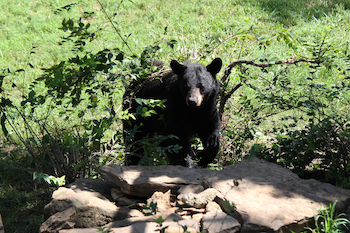Safely Camping in NC
When camping in bear country in North Carolina, it's important to be aware of and follow certain guidelines for safely camping in NC. Top of the list is to minimize interactions with bears. Here's what campers should know about bears in North Carolina:
1. Bear Behavior: Bears are typically shy and avoid human contact. However, they can be attracted to food and may become accustomed to human presence if they find easily accessible food sources. Bears are most active in the early morning and late evening, so be cautious during those times.
2. Food Storage: Proper food storage is crucial to prevent bear encounters. Store all food, cooking equipment, and scented items (like toiletries) in bear-resistant containers, lockers, or vehicles. Never keep food in your tent, as bears have a keen sense of smell and can be attracted to even the faintest food odors.
3. Cooking and Eating: Cook and eat at least 100 yards away from your sleeping area. Avoid cooking strong-smelling foods that could attract bears. Clean up thoroughly after meals, disposing of food scraps properly.
4. Garbage Disposal: Dispose of garbage in designated bear-proof containers or follow park regulations on how to properly dispose of trash. Leaving trash unattended can attract bears and create potentially dangerous situations.
5. Bear Encounters: If you encounter a bear, maintain a safe
distance. Do not approach or feed the bear. Make your presence known by
speaking calmly and firmly, allowing the bear to identify you as a human.
Slowly back away and give the bear space to retreat. Do not run, as it may
trigger a chase response. Read what the Forest Service says.
6. Bear Safety Equipment: It's a good idea to carry bear spray when camping in bear country. Learn how to use it effectively and have it readily accessible. Bear bells or making noise while hiking can also help alert bears to your presence and minimize surprise encounters.

7. Educate Yourself: Familiarize yourself with bear safety guidelines specific to the area where you are camping. Check with park authorities, visitor centers, or park websites for information on recent bear activity, specific regulations, and any bear safety programs offered.
Remember, bears are wild animals, and it is important to respect their space and habitat.
By practicing proper food storage, adhering to campground guidelines, and being knowledgeable about bear behavior, you can minimize the likelihood of bear encounters and promote a safe camping experience in bear country.
More to Know About Safely Camping in NC
Camping in North Carolina can be a wonderful outdoor experience. To ensure a safe and enjoyable camping trip, consider the following tips:
1. Choose a Suitable Campground: Select a campground that suits your preferences and needs. Look for established campgrounds with proper amenities, such as fire rings, picnic tables, and access to clean water and restrooms. Research the campground's rules, regulations, and any specific safety considerations.
2. Check the Weather: Before heading out, check the weather forecast for the area where you plan to camp. Be prepared for changing weather conditions and pack appropriate clothing, including rain gear, warm layers, and sun protection.
3. Set up Camp Carefully: Choose a suitable location for your tent, ensuring it is on level ground and away from hazards like dead trees, rocky areas, or areas prone to flooding. Clear the campsite of any debris or sharp objects that could cause injuries. Be mindful of nearby streams or rivers and set up camp a safe distance away.
4. Fire Safety: Follow all fire regulations and guidelines. Use designated fire rings or pits, and never leave a fire unattended. Ensure the fire is fully extinguished before leaving the campsite or going to sleep. Keep a bucket of water or a fire extinguisher nearby for emergencies.
5. Wildlife Awareness: North Carolina is home to various wildlife species, including bears, snakes, and insects. Research the local wildlife in the area and learn about any specific precautions you should take. Store food and scented items properly to minimize attracting wildlife to your campsite. Follow guidelines for bear safety, as mentioned above.
6. Hygiene and Sanitation: Maintain good hygiene practices while camping. Wash your hands regularly, especially before handling food. Dispose of waste properly in designated trash containers or by following Leave No Trace principles. If there are no restroom facilities, follow the principles of backcountry waste disposal and bury waste in a hole at least 6-8 inches deep and at least 200 feet away from water sources.
7. Stay Hydrated and Pack Essential Supplies: North Carolina's climate can vary, so stay hydrated by drinking plenty of water throughout your camping trip. Pack enough food, cooking equipment, and essential supplies for your stay. Bring a first aid kit, insect repellent, sunscreen, and any necessary medications.
8. Leave No Trace: Practice Leave No Trace principles to minimize your impact on the environment. Pack out all trash, respect wildlife and natural features, and minimize your use of resources. Leave the campsite as you found it, or even better.
9. Be Prepared: Carry a map of the area and know the trails or routes you plan to explore. Inform someone trustworthy about your camping plans, including the location, duration, and expected return date. Bring a fully charged phone and a backup power source for emergencies, but be prepared for limited or no cell phone reception in some remote areas.
By following these guidelines and being mindful of safety considerations, you can enjoy safely camping in NC's beautiful outdoor spaces.
- Home
- Camping in NC
- Safely Camping in NC



